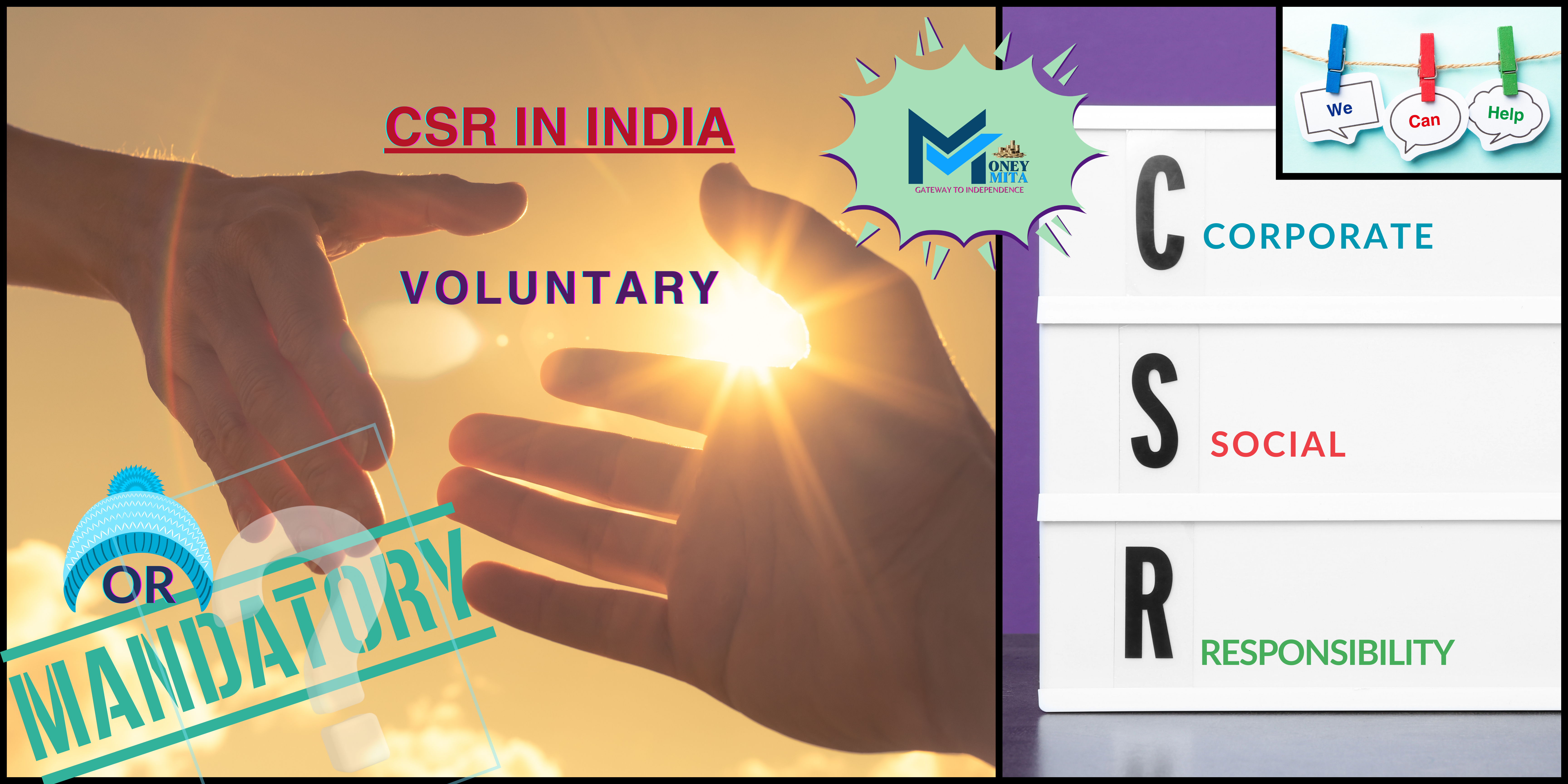Table of Contents
ToggleCorporate Social Responsibility(CSR) In India
Social responsibility encompasses the ethical obligation of individuals, businesses, and organisations to contribute positively to society. In ancient India, social work was an integral part of the cultural ethos, with its scope spanning personal efforts to the contributions of non-profits and large corporations.
Corporate Social Responsibility (CSR) has deep roots in Indian history, guided by religious teachings that emphasise serving the poor and needy, living with integrity, and extending hospitality to guests. The underlying principle is to give back to society in gratitude for what it provides.
Definitions – Corporate Social Responsibility(CSR)
Corporate Social Responsibility (CSR) refers to the activities carried out by companies to fulfil their statutory obligation under Section 135 of the Companies Act, 2013.
It represents a voluntary effort by businesses to contribute to societal and humanitarian welfare. CSR encompasses various initiatives undertaken by large corporations to create a positive impact on society, leveraging their extensive resources and infrastructure. These efforts not only foster societal progress but also enable companies to align profitability with ethical values. Socially responsible businesses utilize CSR to harmonize economic, environmental, and social goals with their operations and growth strategies.
CSR Eligibility: Which Companies Qualify?
Eligibility of companies to undertake CSR Activities
- Every Company, including their holding or subsidiary companies. It includes companies registered under section 8 of the Companies Act 2013 for carrying out non-profit making activities and
- Foreign companies operating in India through branch offices or project offices.
A company is required to comply with CSR provisions in a financial year if it satisfies any of the following criteria in the preceding financial year, as outlined in Section 135(1) of the Companies Act, 2013:
- Net worth of ₹500 crore or more.
- Turnover of ₹1,000 crore or more.
- Net profit of ₹5 crore or more.
Let us understand by an example.
H Limited is the holding company, and S Limited is its subsidiary. While S has met all the requirements under Section 135(1) of the Companies Act and qualifies for CSR activities, H does not meet the eligibility criteria and is therefore not required to comply with CSR provisions.
The key takeaway is that compliance with Section 135(1) is company-specific. The relationship between holding and subsidiary companies does not automatically extend CSR obligations or qualifications across the group. As a result, H cannot qualify for CSR simply because S, within the group, qualifies.
CSR Ineligibility: Which Companies Are Exempt?
Exemption After Ceasing Eligibility
If a company no longer meets the CSR criteria for three consecutive financial years, it:
- Is exempt from forming a CSR Committee.
- Shall not comply with provisions of section 135(2) to 135(6) till the eligibility criteria under section 135(1) are reattained.
- Is no longer obligated to fulfil CSR Committee-related requirements by the board of directors.
- Is not mandated to allocate 2% of its average net profit annually toward CSR activities.
This ensures CSR obligations are linked to the company’s financial capacity.
Benefits Of CSR
Followings are a few benefits that accrue to companies while discharging social obligations.
- Build Brand Reputation: Engaging in social initiatives enhances public trust and strengthens a company’s image.
- Foster Customer Loyalty: Ethical practices resonate with socially conscious consumers, boosting loyalty.
- Attract Talent: Employees prefer working for companies that contribute positively to society.
- Ensure Sustainability: Supporting environmental and social causes creates a stable operating environment.
Activities That Qualify For CSR:-Schedule VII of the Companies Act, 2013
- Projects and programs must be undertaken by the Board of Directors based on CSR Committee recommendations.
- These initiatives should align with the activities specified in Schedule VII of the Companies Act, 2013.
- The areas listed in Schedule VII are broadly aligned with national priorities.
- They emphasise sustainable and inclusive development.
Let’s discuss in brief the items in Schedule VII of the Companies Act, 2013.
1. Hunger and Health:
- Eradicating hunger, poverty, and malnutrition.
- Promoting healthcare (including preventive care) and sanitation.
- Contributions to Swachh Bharat Kosh for sanitation.
- Ensuring access to safe drinking water.
2. Education and Livelihood:
- Promoting education, including special education.
- Enhancing vocational skills for children, women, elderly, and differently-abled individuals.
- Supporting livelihood enhancement projects.
3. Social Equality:
- Promoting gender equality and empowering women.
- Establishing homes/hostels for women and orphans.
- Setting up old-age homes and facilities for senior citizens.
- Reducing inequalities for socially and economically backward groups.
4. Environmental Sustainability:
- Ensuring ecological balance and protecting flora, and fauna, the safety of animals, horticulture and preservation of natural resources.
- Contributions to the Clean Ganga Fund for river rejuvenation.
5. Heritage and Culture:
- Protecting national heritage, art, and culture.
- Restoring historical sites and works of art.
- Supporting public libraries and traditional arts/handicrafts.
6. Veterans And Dependants:
- Providing support to armed forces veterans, war widows, their dependents.
- Extending aid to veterans of the Central Armed Police Forces (CAPF) and Central Para-Military Forces (CPMF).
7. Sports:
- Promoting rural, national, Paralympic, and Olympic sports.
8. Relief Funds:
- Contributions to the PM’s National Relief Fund, PM CARES Fund, or other socio-economic welfare funds.
9. Research and Development:
- Contributions to incubators, R&D projects in the discipline of science, technology, and medicine funded by the State or the Central Government or their allied agencies or any public sector undertaking
- Donations to public-funded institutions engaged in various research activities e.g., Indian Institute Of Technology (IITs), Department of Pharmaceutical, AYUSH, DRDO, ICMR, and CSIR.
10. Rural and Urban Development:
- Implementing rural development projects.
- Undertaking slum area development.
11. Disaster Management:
- Supporting relief, rehabilitation, and reconstruction efforts during disasters.
FUNDING FROM CSR FUNDS IN COVID-19
During the pandemic of COVID which started in March 2020, the Government of India on declaring COVID-19 a disaster, took several proactive measures to deal with it. Several circulars were issued from time to time allowing different activities as eligible for CSR funding. All these activities fall under the broad group of one or both items as depicted in Schedule VII above.
Let’s discuss them in short.
TABLE – 1
| Eligible Projects In COVID For CSR Funding | Serial Number Of The General Circular | Date Of The General Circular | Link Of The General Circular |
| Promotion of general as well as preventive health care, sanitation and disaster management as depicted in SL No. 1 and 11 above. | 10/2020 | MARCH 23, 2020 | https://www.mca.gov.in/Ministry/pdf/Covid_23032020.pdf |
| Awareness campaign on COVID-19 Vaccination Programmes. | 01/2021 | JANUARY 13, 2021 | https://www.mca.gov.in/Ministry/pdf/CSR2021_13012021.pdf |
| Setting up makeshift hospitals or COVID care facilities | 05/2021 | APRIL 22, 2021 | https://www.mca.gov.in/bin/ebook/dms/getdocument?doc=MTM0Njk=&docCategory=Circulars&type=open |
| 1. For evolving COVID-19 healthcare infrastructure. 2. Setting up medical oxygen generation and storage facilities 3. Producing and supplying Oxygen concentrators, ventilators, cylinders and other medical equipment to combat COVID-19’. | 09/2021 | MAY 5, 2021 | https://www.mca.gov.in/bin/ebook/dms/getdocument?doc=MTM0NTA=&docCategory=Circulars&type=open |
| E-vouchers for COVID 19 Vaccinations for persons other than employees and their families of respective companies. | 13/2021 | JULY 30, 2021 | https://www.mca.gov.in/bin/dms/getdocument?mds=LYGLgEX5HiF2cj%252FEWlnVfA%253D%253D&type=open |
Activities Not Eligible For CSR
The CSR Rules exclude the following activities from qualifying as eligible CSR initiatives:
1. Activities in the Normal Course of Business:-Generally, activities carried out as part of a company’s regular business operations do not qualify as CSR.
- EXCEPTION
During the financial years 2020-21, 2021-22, and 2022-23 (COVID era), R&D activities as part of regular operations, related to drugs, new medicines, vaccines, etc., undertaken in collaboration with organizations listed in Schedule VII (e.g., Central/State government agencies, IITs, ICMR) and disclosed in board reports, are eligible for CSR.
2. Activities Conducted Outside India: Activities outside India are not eligible for CSR initiatives barring the below.
- EXCEPTION
Providing training to Indian sports personnel representing states or Union Territories at national or international levels is recognized as a CSR activity.
3. Political Contributions: Contributions, direct or indirect, to political parties under Section 182 of the Act are excluded from CSR.
4. Exclusive Benefits to Employees: Activities exclusively benefiting company employees or their families do not qualify as CSR.
- EXCEPTION
Activities that incidentally benefit employees or their families, alongside the general public, are eligible.
5. Sponsorships with Marketing Intent: Sponsorships aimed at promoting products or services for marketing benefits are not CSR activities.
- EXCEPTION
If brand promotion occurs as a collateral outcome of genuine CSR activities benefiting the public at large, it is considered CSR.
CSR in India: Voluntary or Mandatory?
Pre-existing Tradition of Corporate Philanthropy
Before 2014, CSR in India was largely voluntary, with many businesses engaging in social initiatives as part of their philanthropic activities. Major corporations, particularly family-owned businesses like the Tatas, Birlas, and others, had a long history of contributing to societal development. However, these efforts were sporadic and lacked consistent enforcement or a formal framework.
Global Push for CSR
India’s decision to formalize CSR also came at a time when many countries, especially in the West, were incorporating CSR frameworks into their corporate governance systems. International movements and organizations, such as the United Nations Global Compact (launched in 2000), advocated for businesses to adopt socially responsible practices. This global shift influenced India’s policy to integrate CSR into its legal framework.
Companies Act 2013′ And the Role of the Government
The government recognized that businesses, particularly large corporations, had the resources to address pressing social issues like education, healthcare, sanitation, and environmental sustainability. Thus, the idea was to ensure that businesses contributed systematically to the development of the nation.
CSR Voluntary OR Mandatory In India?
A careful examination of the whole discussions above makes it clear that CSR is not a voluntary activity for all companies. While some companies are eligible to engage in CSR initiatives, they cannot arbitrarily decide how to allocate CSR funds. Only those activities recommended by the CSR Committee to the board of directors, and listed in Schedule VII of the Companies Act 2013, qualify for CSR funding. This ensures that CSR is governed by specific guidelines and objectives.
Thus, CSR in India is not an optional act for all companies. It becomes a mandatory obligation for eligible companies upon meeting certain criteria.
Legal Compliance of CSR in India
India was the first country to introduce CSR as a legal requirement for corporations, setting a global precedent by implementing legal provisions, a structured framework, and mandatory disclosures starting from April 1, 2014. The legal framework for CSR in India can be divided into three main components:
- Section 135 of the Companies Act, 2013: This section outlines the fundamental provisions of CSR, including the formation of a CSR Committee, the responsibilities of the board of directors regarding CSR activities, the spending limits, provisions for handling unspent CSR amounts, disclosure requirements, and penalties for non-compliance.
- Schedule VII of the Companies Act, 2013: This schedule specifies the areas where companies are permitted to allocate CSR funds, ensuring that spending aligns with national priorities and societal needs.
- Companies CSR Policy Rules, 2014: These rules provide guidelines for companies to comply with CSR provisions, offering detailed instructions on how to implement CSR initiatives effectively.
In summary, CSR in India is not merely a voluntary choice but a legal obligation for qualifying companies, governed by specific regulations and procedures aimed at fostering social responsibility and national development.
Frequently Asked Questions(FAQ)
Q1. What is a foreign company u/s 2(42) of the Companies Act 2013′?
Ans. A foreign company is defined under Section 2(42) of the Companies Act, 2013 as a company or body corporate that is incorporated outside India, but:
i) Has a place of business in India, whether by itself or through various means such as a branch, subsidiary, or representative office in India.
ii) Carries on business in India either directly or through an agent physical or electronic.
Q2. What is COVID-19 ?
Ans. COVID-19 is a contagious disease caused by the SARS-CoV-2 virus, which is a novel coronavirus that emerged in late 2019. It mainly spreads via respiratory droplets released when an infected person coughs, sneezes or speaks. The term “COVID-19” refers to Coronavirus Disease 2019, signifying the year it was first detected.
Q3. What is the PM CARES Fund?
Ans. “The PM CARES Fund” stands for Prime Minister’s Citizen Assistance And Relief In Emergency Situations Fund.
It is a public charitable trust established by the Government of India in March 2020, primarily in response to the COVID-19 pandemic. The fund aims to provide financial assistance and relief in situations of public emergencies and disasters. The Fund receives contributions from individuals, organizations, and corporations, both within India and abroad. Contributions to this is an eligible CSR expenditures for companies in India. Donations to PM CARES Fund would qualify for Section 80G benefits for 100% exemption under the Income Tax Act, of 1961.








